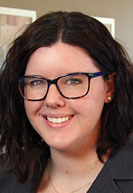Subscriber Benefit
As a subscriber you can listen to articles at work, in the car, or while you work out. Subscribe NowElizabeth Baumhart has been a practicing trademark attorney for about five years now.
In that time, she’s learned to put a bold, underlined warning on every file notification email she sends to clients.
The warning: Be on the lookout for scams.
The trademark filing process is very public by nature, complete with an address, phone number and other information.

Baumhart, a trademark and copyright attorney in Taft Stettinius & Hollister LLP’s intellectual property group, estimated that about 90% of her clients get a scam letter.
The letters can look official — like they’re coming straight from the U.S. Patent and Trademark Office — and typically have some kind of language saying the applicant has to pay a fee to keep their application from lapsing.
The USPTO wasn’t able to provide data on the frequency of scams or how much money gets flushed into them, but officials and attorneys agree that scam activity is on the rise.
Scams range from straightforward fraud — lying to applicants and the USPTO to make money — to services that really do exist but are misleading to applicants by making them think it’s necessary or somehow endorsed by the USPTO.
‘Yeah, you might fall for it’

Jason Lott, managing attorney for trademarks customer outreach with the USPTO, said scammers are going after people who are new to trademark registration and don’t yet understand the “quirks of the system.”
He said scammers can spoof the USPTO’s phone number and call applicants, telling them they have something like 48 hours to pay money they owe or else their applications can’t go forward.
“It looks like our number,” Lott said. “Yeah, you might fall for it. And people certainly have.”
Lott’s job is to educate people about trademarks. He was previously an examining attorney with the USPTO.
Lott was in Indianapolis recently for an event at the Central Library where people with questions about trademarks and patents could meet experts in the field. He told attendees the USPTO will never ask for a credit card, Social Security number or other similar information.
“These folks are aggressive,” he warned attendees about scammers.
How a company in Pakistan tried to scam clients
Some scams involve the unauthorized practice of law, with companies providing false information in thousands of trademark submissions to the USPTO — including contact information and signatures — with the goal of deceiving the office and applicants.
A 2021 show cause order from the USPTO offers a glimpse of how the scams work.
In the 2021 case, the office accused a company based in Pakistan of operating more than a dozen unincorporated entities with names such as US Trademark Pros and Trademark Kingdom that altered correspondence from the USPTO, overcharged application filing fees and even impersonated the USPTO.
The websites for the entities were similar and offered the same services. Most of the websites included an identical review from “Ivan Marsh,” who thanked the companies for helping register “our first trademark” and acknowledged the companies provided services and advice that a lawyer would typically be hired to provide.
The show cause order includes an online ad that purports to offer $49 trademark registration and says the services are “recommended” by the USPTO.
“The services provided by the Trademark Filing Entities are legal services that constitute practice before the USPTO,” the order says, “but the USPTO is not aware of any U.S. licensed attorney working with or for Respondents in the preparation and prosecution of the U.S. trademark applications at issue in this matter.”
The USPTO accused the companies of providing email addresses for correspondence that they controlled, then modifying correspondence intended for the applicant. That included invoices.
In one example, the filing fee charged to an applicant was $776, even though the USPTO said application filing fees are always divisible by five. The amount charged to applicants would also be inflated — from $275 to $825 in one case.
The company was sanctioned in 2022. Proceedings involving submissions filed by the respondents were terminated, and the respondents were precluded from further correspondence or submissions with the USPTO.
‘The education has to be key’
There isn’t much attorneys can do to ward off scams targeted at their clients, other than being proactive with warnings.
“The education has to be key,” Baumhart said.
Another thing Baumhart said she can do is put her firm’s address on the part of the filing that’s public record while her client’s address is on another part of the application. That means a lot of solicitations end up at her firm rather than the client’s home or business.

Andrew Nevill, a patent and trademark attorney at Woodard Emhardt Henry Reeves & Wagner LLP, said he warns clients that they’ll likely get solicitations from private entities that may look like they’re coming from the USPTO.
“I think it’s important to let our clients know that this is happening,” Nevill said.
Part of the problem, Nevill said, is that the filing process is complicated, so clients could easily get confused about what’s real and what’s not.
“It’s complicated enough,” he said, “and it’s not like it’s something people do every day.”
Lott said the USPTO is working on a new version of the filing system that will be more user-friendly with plain language.
Right now, the application is a fill-in-the-blank system, Lott said, which works well for experienced practitioners who know exactly what information to include. But it can be a difficult process for others, especially applicants who don’t use an attorney.
“I think one of the biggest obstacles is that there isn’t always a lot of intellectual property education at a very base level,” Lott said. “So a lot of times, people are starting a business and they don’t even understand the basics of what a trademark is.”
‘I’m ready to start my journey’
Don’t count Willie Wiggins among those who are particularly worried about scams or the complexity of the filing process. He was at the “Demystifying Patents and Trademarks” event at the Indianapolis Central Library last month and said he walked away with a plan.
That includes taking advantage of a pro bono service offered through the Indiana University Robert H. McKinney School of Law.
Wiggins, whose ideas range from waste management to the aerospace industry, said it’s important to find the people who know what they’re doing and can help.
“As long as you speak with them and have the real professionals guide you on what you need to do, I don’t see a real problem with it,” he said.
Wiggins said he was skeptical of going to the library event at first, but ultimately, it gave him more confidence.
“I’m ready to start my journey,” he said.•
Please enable JavaScript to view this content.

